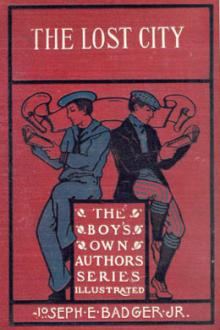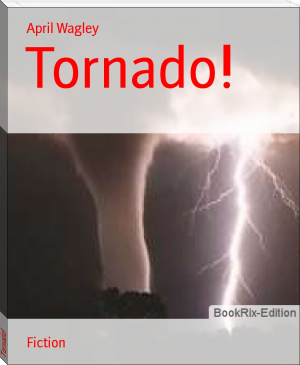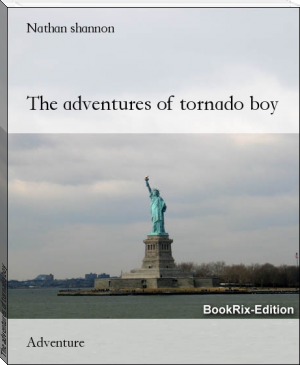The Lost City - Jr. Joseph E. Badger (children's books read aloud txt) 📗

- Author: Jr. Joseph E. Badger
- Performer: -
Book online «The Lost City - Jr. Joseph E. Badger (children's books read aloud txt) 📗». Author Jr. Joseph E. Badger
as one might caress an inestimable treasure, a dreamy, almost
blissful expression upon his sun-browned face.
“I thank you, sir, more than tongue can tell,” he said, quietly,
as he restored the pipe to its owner. “If you could only realise
what I have suffered through this deprivation! I, an inveterate
smoker; yet suddenly deprived of it, and so kept for ten long
years! If I had had a pipe and tobacco, I believe—but enough.”
“I can sympathise with you, at least in part, my friend. Will
you have another smoke, by the way?”
“No, no, not now; I feel blessed for the moment, and more might
be worse than none, after so long deprivation. And—may I talk
openly to you, dear, kind friends? May I tell you—am I selfish
in wishing to trouble you thus? Ten years, remember, and not a
soul to speak with!”
He laughed, but it was a sorry mirth; and not caring to trust his
tongue just then, uncle Phaeton nodded his head emphatically
while filling his pipe for himself. But Waldo never lacked for
words, and spoke out:
“That’s all right, sir; we can listen as long as you can
chin-chin. Tell us all about—well, what’s the matter with that
big Injun?”
“Quiet, Waldo. Say what best pleases you, my friend. You can be
sure of one thing,—sympathetic listeners, if nothing better.”
With a curious shiver, as though afflicted with a sudden chill,
Edgecombe turned partly away, figure drawn rigidly erect, hands
tightly clasped behind his back. A brief silence, then he spoke
in tones of forced composure.
“A balloon was the best, in my day, and I was proud of my
profession, although even then I was dreaming of better
things—of something akin to this marvellous creation of yours,
sir,” casting a fleeting glance at the air-ship, then at the face
of its builder, afterward resuming his former attitude.
“Let that pass, though. I wanted to tell you how I met with my
awful loss; how I came to be out here in this modern hell!
“I had a wife, a daughter, each of whom felt almost as powerful
an interest in aerostatics as I did myself. And one day—but,
wait!
“I had an enemy, too; one who had, years before, sought to win my
love for his own; in vain, the cur! And that day—we were out
here in Washington Territory, living in comparative solitude that
I might the better study out the theory I was slowly shaping in
my brain.
“The day was beautiful, but almost oppressively warm, and, as
they so frequently wished, I let my dear ones up in the balloon,
securely fastening it below. And then—God forgive me!—I went
back to town for something; I forget just what, now.
“A sudden storm came up. I hurried homeward; home to me was
wherever my dear ones chanced to be; but I was just too late!
That devil of all devils was ahead of me, and I saw him—merciful
God! I saw him—cut the ropes and let the balloon dart away upon
that awful gale!”
His voice choked, and for a few minutes silence reigned. Knowing
how vain must be any attempt to offer consolation, the trio of
air-voyagers said nothing, and presently Cooper Edgecombe spoke.
“I killed the demon. I nearly tore him limb from limb; I would
have done just that, only for those who came hurrying after me
from town, knowing that I might need help in bringing my balloon
to earth in safety. They dragged me away, but ‘twas too late to
cheat my miserable vengeance. That hound was dead, but—my
darlings were gone, for ever!”
Another pause, then quieter, more coherent speech.
“God alone knows whither my wife and child were taken. The
general drift was in this direction, but how far they were
carried, or how long they may have lived, I can only guess;
enough that, despite all my inquiries, made far and wide in every
direction, I never heard aught of either balloon or passengers!
“After that, I had but one object in life: to follow along the
track of that storm, and either find my loved ones, or—or some
clew which should for ever solve my awful doubts! And for two
long years or more I fought to pierce these horrid
fastnesses,—all in vain. No mortal man could succeed, even when
urged on by such a motive as mine.
“Then I determined upon another course. I worked and slaved
until I could procure another balloon, as nearly like the one I
lost as might be constructed. Then I watched and waited for just
such another storm as the one upon whose wings my darlings were
borne away, meaning to take the same course, and so find—”
“Why, man, dear, you must have been insane!” impulsively cried
the professor, unable longer to control his tongue.
“Perhaps I was; little wonder if so,” admitted Edgecombe, turning
that way, with a wan smile lighting up his visage. “I could no
longer reason. I could only act. I had but that one grim hope,
to eventually discover what time and exposure to the weather
might have left of my lost loves.
“Then, after so long waiting, the storm came, blowing in the same
direction as that other. I cut my balloon loose, and let it
drift. I looked and waited, hoping, longing, yet—failing! I was
wrecked, here in this wilderness. My balloon was carried away.
I failed to find—aught!”
Cooper Edgecombe turned towards the air-ship, with a sigh of
regret.
“If one had something like this then, I might have found
them,—even alive! But now—too late—eternally too late!”
CHAPTER XIII. THE LOST CITY OF THE AZTECS.
Uncle Phaeton was more than willing to do the honours of his pet
invention, and this afforded a most happy diversion, although the
deepening twilight hindered any very extensive examination.
Cooper Edgecombe showed himself in a vastly different light while
thus engaged, his shrewd questions, his apt comments, quite
effectually removing the far from agreeable doubts born of his
earlier words and demeanour.
“Well, if he’s looney, it’s only on some points, not as the whole
porker, anyway,” confidentially asserted Waldo, when an
opportunity offered. “Coax him to tell how he knocked the
redskin out, uncle Phaeton.”
Little need of recalling that perplexing incident to the worthy
savant, for, try as he might, Featherwit could not keep from
brooding over that wondrous collection of relics pertaining to a
long-since extinct people. Of course, the last one had perished
ages ago; and yet—and yet—
Through his half-bewildered brain flashed the accounts given by
the coast tribes, members of which he had so frequently
interviewed concerning this unknown land, one and all of whom had
more or less to say in regard to a strange people, terrible
fighters, mighty hunters, one burning glance from whose eyes
carried death and decay unto all who were foolhardy enough even
to attempt to pass those mighty barriers, built up by a
beneficent nature. Only for that nearly impassable wall, the
entire earth would be overrun and dominated by these monsters in
human guise.
Then, after the air-ship was cared for to the best of his
ability, and the night-guard set in place so that an alarm might
give warning of any illegal intrusion, the little party returned
to the cavern home of the exile where, after another refusal on
his part, the professor filled and lighted his beloved pipe.
Almost in spite of himself Featherwit was drawn towards those
marvellous articles depending from the wall, and, as he gazed in
silent marvel, Cooper Edgecombe drew nigh, with still other
articles to complete the collection.
“You may possibly find something of interest in these, too, dear
sir, although I have given them rather rough usage. This formed
a rather comfortable cap, and—”
“A helmet! And sandals! A sash which is—yes! worn about the
waist, mainly to support weapons, and termed a maxtlatl,
which—and all sufficiently well preserved to be readily
recognised as genuine—unless—Surely I am dreaming!”
If not precisely that, the worthy professor assuredly was almost
beside himself while examining these articles of warrior’s wear,
one by one, knowing that neither eyes nor memory were at fault,
yet still unable to believe those very senses.
Up to this, Cooper Edgecombe had felt but a passing interest in
the matter, forming as it did but a single incident in a more
than ordinarily eventful life; but now he began to divine at
least a portion of the truth, and his face was lighted up with
unusual animation, when Phaeton Featherwit turned that way, to
almost sharply demand:
“Where did you gain possession of these weapons and garments,
sir? And how,—from whom?”
“I took them from an Indian, nearly two years ago. He caught me
off my guard, and, when I saw that I could neither hide nor flee,
I fought for my life,” explained the exile; then giving a short,
bitter laugh, to add: “Strange, is it not? Although I had long
since grown weary of existence such as this, I fought for it; I
turned wild beast, as it were! Then, after all was over, I took
these things, more because I feared his comrades might suspect—”
“His comrades?” echoed the professor. “More than the one, then?
You killed him, but—there were others, still?”
“Many of them; far too many for any one man to withstand,”
earnestly declared the exile. “I made all haste in bearing the
redskin here, obliterating all signs as quickly as possible; yet
for days and nights I cowered here in utter darkness, each minute
expecting an attack from too powerful a force for standing
against.”
Uncle Phaeton rubbed his hands briskly, shifting his weight
hurriedly from one foot to its mate, then back again, the very
personification of eager interest and growing conviction.
“More of them? A strong force? Armed,—and garbed as of old?
The clothing, the footwear, and, above all else, the weapons,
purely Aztecan? And here, only two short years ago?”
“Sadly long and hideously dreary years I have found them, sir,”
the exile said, in dejected tones.
The professor burst into a shrill, excited laugh, which sounded
almost hysterical, and, not a little to the amazement of his
nephews, broke into a regular dance, jigging it right merrily,
hands on hips, head perked, and chin in air, at the same time
striving to carry the tune in his far from melodious voice.
After all, perhaps no better method could have been taken to work
off his almost hysterical excitement, and presently he paused,
panting and heated, chuckling after an abashed fashion as he
encountered the eyes of his nephews.
“Not a word, my dear boys,” he hastened to plead. “I had to do
something or—or explode! I feel better, now. I can behave
myself, I hope. I am calm, cool, and composed as—the genuine
Aztecs! And we are the ones to discover that—oh, I forgot!”
For Waldo was fairly exploding with mirth, while Bruno smiled,
and even the exile appeared to be amused to a certain extent at
his expense.
Little by little, the worthy savant calmed down, and then, almost
forcing the exile to indulge in another delicious smoke, he led
up to the subject in which his interest was fairly intense.
Cooper Edgecombe was willing enough to tell all that lay in his
power, although he was only beginning to realise how much that
might mean to the world at large, judging by the actions of the
professor.
According to his account, the great lake, or drainage reservoir
of the Olympics, was a sort of semi-yearly rendezvous for a
warlike tribe





Comments (0)